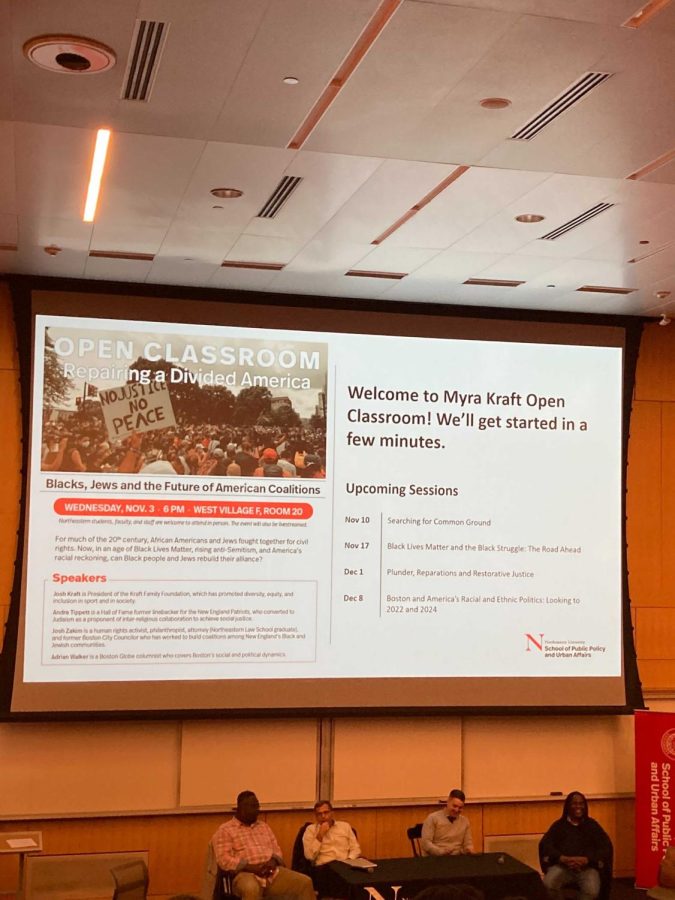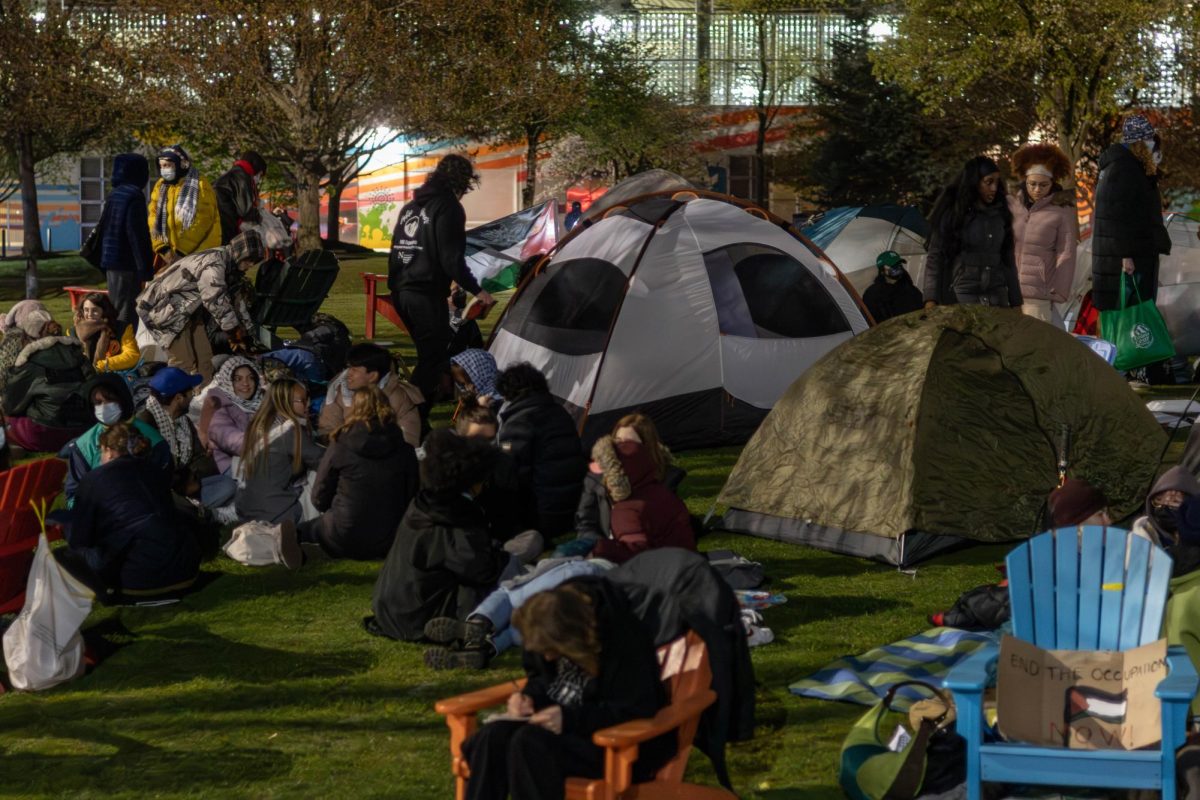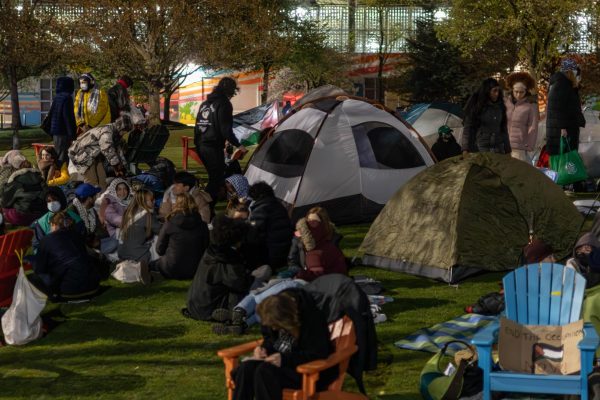Speakers encourage building bridges at ‘Open Classroom’
The Nov. 3 panel “Blacks, Jews and the Future of American Coalitions,” took place in the Visitor Center.
November 8, 2021
Every semester since 2015, Northeastern University’s School of Public Policy and Urban Affairs has hosted its “Open Classroom” series. According to the school’s website, the series “seeks to invite diverse audiences to converge around a central theme and generate conversation about current topics relevant to our local and national communities.”
This semester, the series will focus “on hate crimes, anti-Semitism, anti-Asian discrimination, and on ways of bringing together disparate groups to address discrimination and reconciliation.” The lecture series is supported by the Kraft Family Philanthropies/Foundation to Combat Anti-Semitism and facilitated by two Northeastern professors, Jonathan Kaufman, the director of the School of Journalism, and Theodore Landsmark, distinguished professor of public policy and urban affairs. The duo moderated the panel, “Blacks, Jews and the Future of American Coalitions,” Nov. 3 in the lecture hall of the Visitor Center.
The panel focused on the importance of building connections between different groups of people and shared examples of where they saw this process unfold in their own lives.
“There is always a need for bridge-building, coalition-building and for funding,” said Josh Zakim, a former Boston city councilor and son of the late Boston political activist Lenny Zakim.
The panel, which garnered a near-full lecture hall of students in NU’s West Village F and an estimated online attendance of over 200 people, was populated by a wide range of professionals. The panel was made up of Andre Tippett, hall of fame NFL linebacker and current executive director of community affairs for the New England Patriots; Zakim; Adrian Walker, a columnist for the Boston Globe and Josh Kraft, president of Kraft Family Philanthropies. Each of them shared a common message — the key to creating change in the world is forming foundational relationships across political, ethnic, racial and religious lines.
During the two-hour panel, Landsmark acknowledged the challenges of eliminating hate both across the United States and throughout the world. He stated the purpose of the 14-session class was to start a conversation about coalition-building.
“What we are trying to get at is not just the immediate issues, but the fundamental core issues of hate and how we can change and improve that,” Landsmark said. “We as faculty recognize that we are not going to solve the issues in one semester. We want to raise lasting questions and start meaningful conversations.”
Tippett, who converted to Judaism 27 years ago, worked with Patriots owner Robert Kraft to help introduce both former and current NFL players to the lives and traditions of people in Israel. Tippett was one of the main facilitators of three trips that were taken to Israel in which the athletes met Israeli football players, visited holy sites and were baptized in the Jordan River.
He shared stories of discrimination he faced in his own life, both as a Jewish person and a Black man, and said that when talking to someone who may be different from yourself it is important to “humanize our differences,” rather than focusing on what might make people different.
When it came to how he wanted to grow his community and work to stamp out discrimination, Tippett said, “Having that conversation, being able to talk to people and share things of importance, to tell people it’s not alright to stand by and watch things happen to other people is incredibly important.”
Starting conversations was another key talking point for the group. Zakim was the first to respond when Landsmark asked about the tools required to bring the city together.
“It’s about personal relationships. It is easier to ‘other’ someone if you don’t know them,” Zakim said. “Getting to know people on a personal level is critically important.
If we can bring people together to just talk, problem-solving becomes easier.”
Kraft, who spent time working with the Boys & Girls Club in Boston before working for his family’s philanthropic foundation, discussed the simple ways in which he saw people from different backgrounds connect in Boston.
For Kraft, one of the most “unifying events” in Boston was the Boys & Girls Club’s holiday season celebrations in Charlestown. He recalled an anecdote where he saw a child from housing projects in Bunker Hill decorating cookies with a child from a multimillion-dollar townhouse in Charlestown. When he saw the parents of the children starting a conversation with each other, he realized how important it was to just communicate with other people from different backgrounds and realized that people shouldn’t focus on what differentiates them from each other.
“Let’s start finding what we have in common instead of magnifying what we don’t have in common,” Kraft said.
Walker, who spent election day talking to citizens at voting stations, discussed the ways he saw different “coalitions” form in the election of Michelle Wu the day prior. He highlighted the combination of young progressives and minority populations that helped “defeat the old coalition that elected [former Mayor] Marty Walsh.”
The panel said that with the creation of any new coalition keeping the communication going and not growing complacent is key. Walker stated that creating relationships with people that may look different from you or believe different things is simply the start of having a strong, equal society.
“Coalition-building is just really the beginning and representation is the real issue,” Walker said on coalitions and collaborations both formal and informal. “The question is of what you are going to do with that coalition when you get it and what it will be used for.”


















